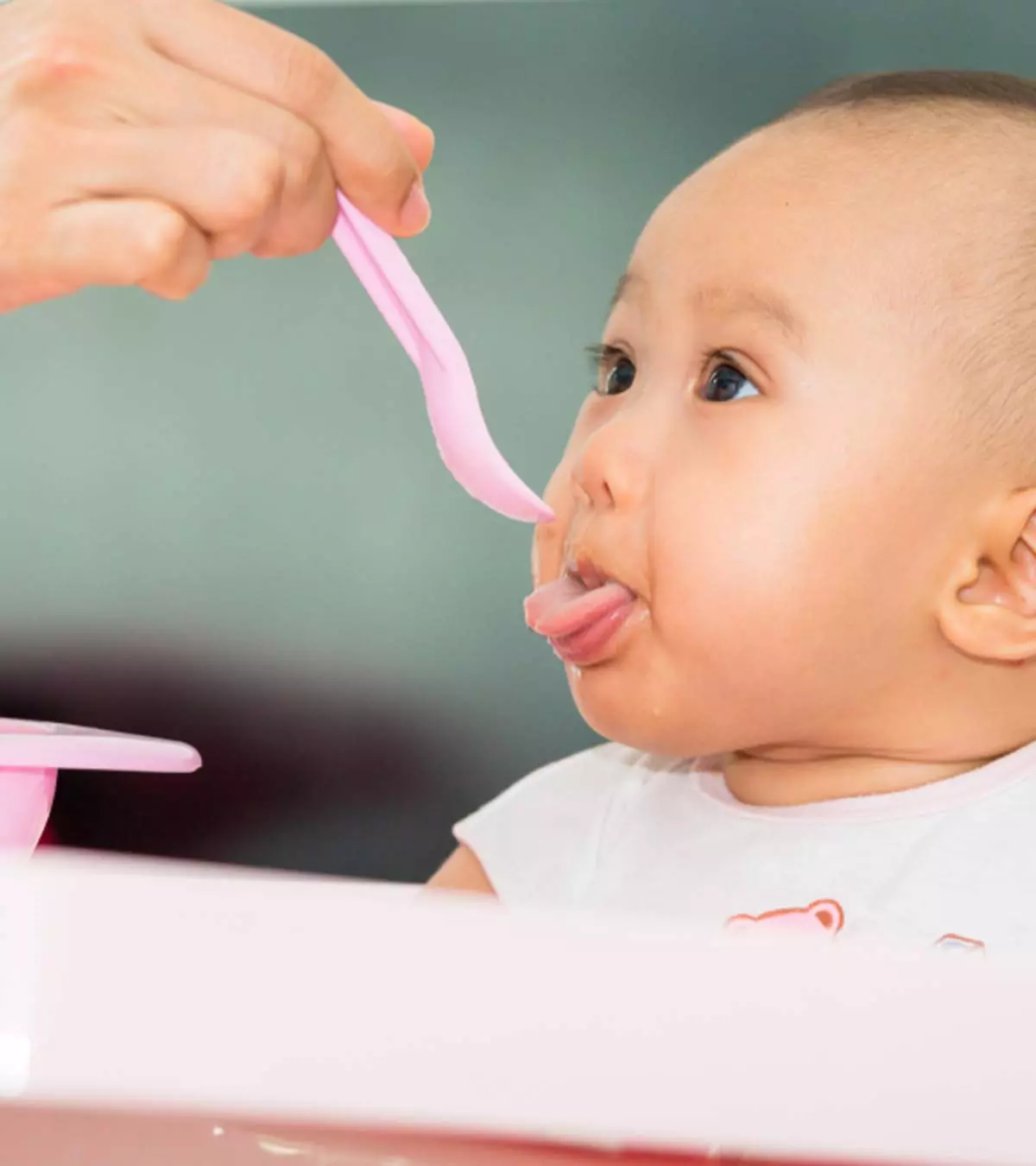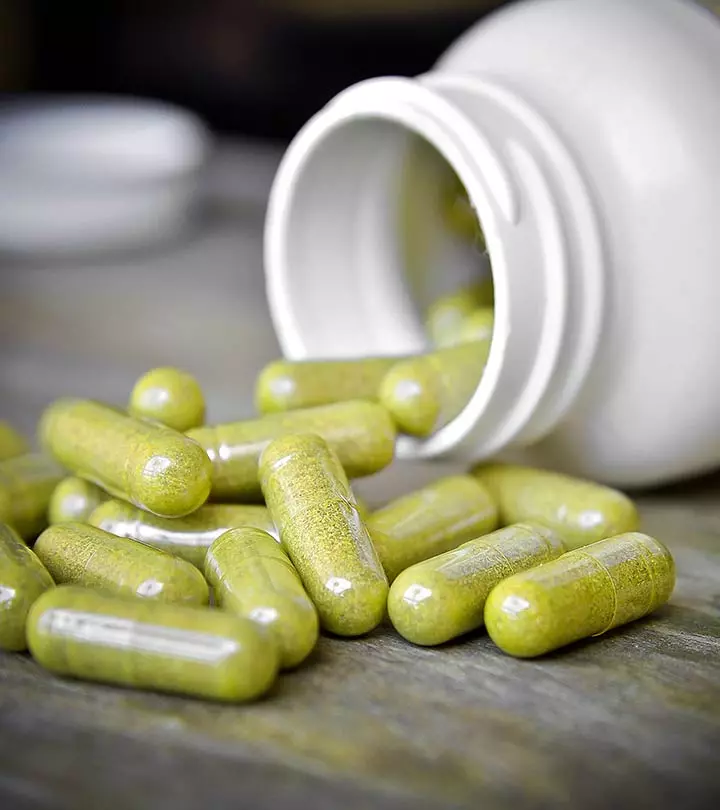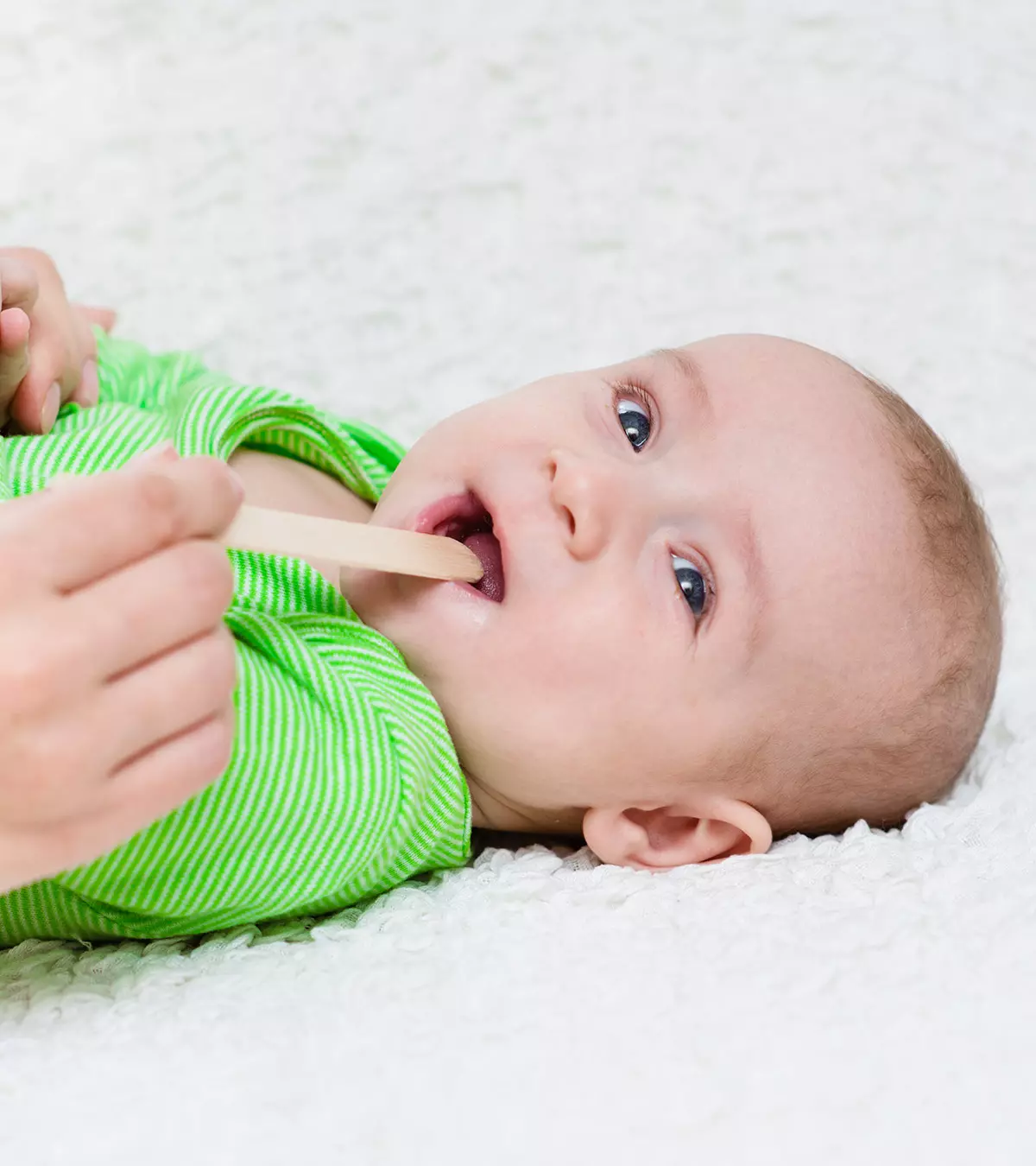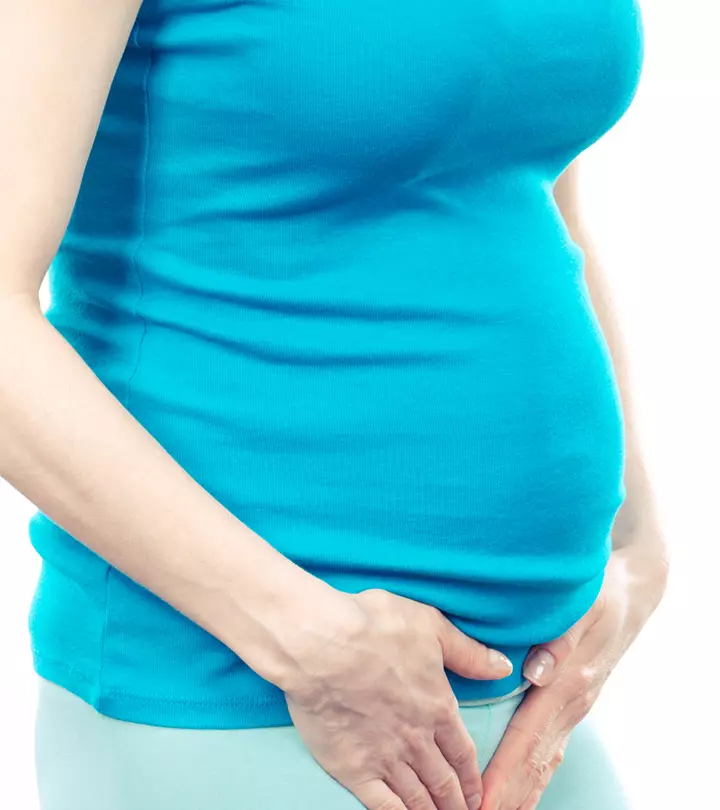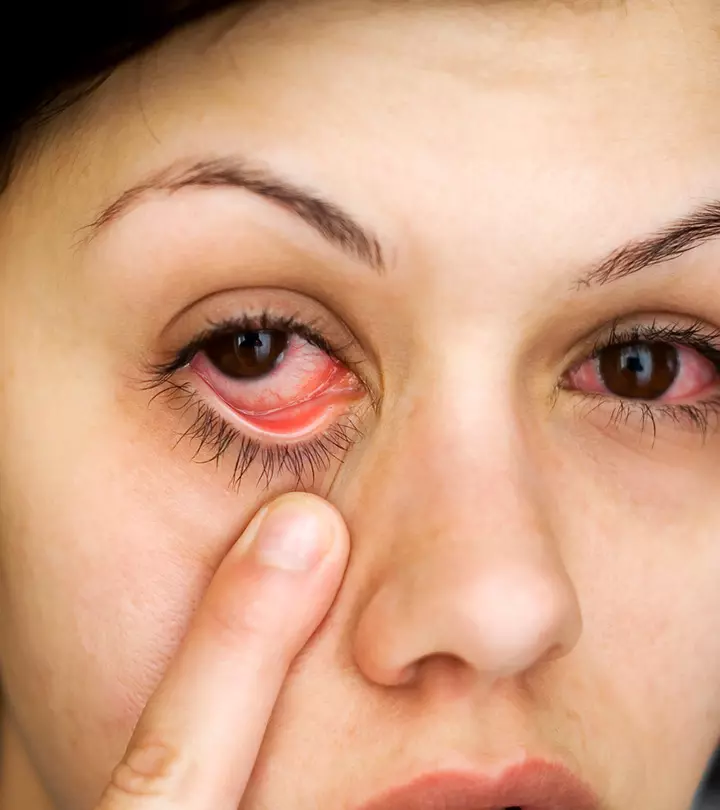
Image: iStock
Pink eye in pregnancy is a common eye-related infection, which gives the eyes a red or pinkish-red appearance. Pink eye or conjunctivitis is an inflammation of the conjunctiva (clear membrane covering the white of the eye) and the inner lining of the eyelid. The incidence is also high in children and adults and is contagious (1).

The infection usually resolves within a week and is harmless. Learn about the causes, symptoms, treatment, and ways to treat pink eye naturally.
Key Pointers
- Conjunctivitis or pink eye in pregnancy is a common eye infection that is bothersome but seldom a cause for concern for you or the baby.
- It is caused by bacterial or viral infections, exposure to irritants, or allergies.
- Based on the cause, pink eye can show different symptoms, such as the pink or red color of the white of the eye, itchiness, and pus or mucusiA sticky material lining the nose, lungs, throat, mouth, sinus, stomach, and intestines discharge.
- Treatment relies on the cause and severity of the symptoms, but natural remedies, such as warm and cold compresses, could help relieve symptoms.
What Are The Causes Of Conjunctivitis During Pregnancy?
The causes of conjunctivitis or pink eye in pregnancy are similar to the causes in other people. The most common ones include (1):
- Bacteria: Bacteria are one of the most common causes of pink eye. If you notice red eyes with yellow or green discharge or crusting throughout the day, you will likely have bacterial conjunctivitis. This may affect one or both eyes. Bacterial conjunctivitis may be caused by Staphylococcus aureus, Streptococcus pneumonia, Haemophilus influenzae, and Pseudomonas aeruginosa bacteria (2).
- Virus: If you notice that your eyes are red but have little or no discharge and crusting on waking up in the morning, you will likely have viral conjunctivitis. This might affect both eyes. Common cold virus (adenovirus), flu virus, and even coronavirus may cause pink eye (3).
- Allergies: Apart from bacteria and viruses, another prevalent cause of pink eye in pregnancy is allergies (1). Seasonal conjunctivitis is often seen in spring and can affect both eyes in most cases. You will notice redness in the eyes without any drainage and minimal itching. Common allergens include dust, pollen, and mold.

- Irritants: Sometimes, irritants or chemicals from products, including shampoos, conditioners, contact lenses, lens solutions, chlorine in swimming pools, and even smoke, can trigger pink eye.
Other conjunctivitis causes include foreign objects in the eye and sexually transmitted infections (STIs).
Is Pink Eye Contagious?
Most women who contract pink eye during pregnancy worry about passing on the infection to their baby.
While there are several myths about this eye infection, you should know that only bacterial and viral conjunctivitis are contagious and can spread to the other eye or from one person to the other. Viral conjunctivitis is relatively contagious until the discharge from the eye subsides (4).
While the pink eye can be highly annoying during pregnancy, it cannot spread to your unborn baby. If you develop an eye infection while pregnant, it’s crucial to consult your healthcare provider to ensure proper treatment and avoid complications.
What Are The Symptoms Of Pink Eye During Pregnancy?
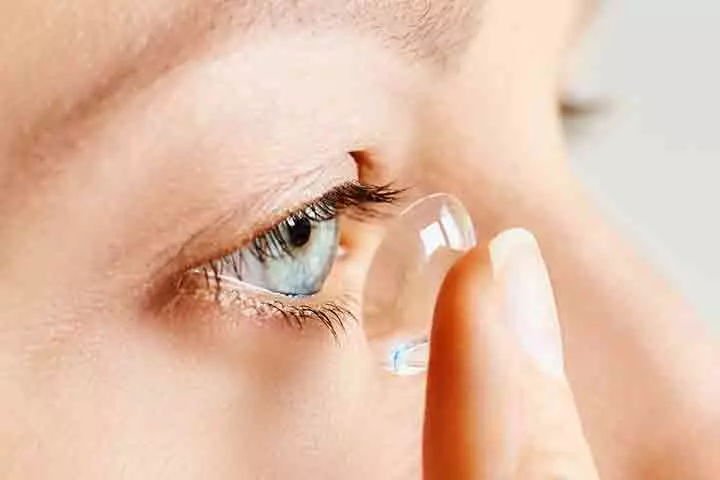
The symptoms of pink eye differ based on the cause of the condition. Some common symptoms of pink eye include (5):
- Pink or red color of the white of the eye
- Swelling or inflammation of the conjunctiva
- Increased production of tears
- Feeling of something stuck in the eye
- Itchiness
- Irritation or burning sensation
- Pus or mucus discharge
- Crusting of the eyelids or eyelashes, especially on waking up from sleep
- Discomfort on wearing contact lenses
Other symptoms specific to the different types of pink eye are (5):
- Bacterial conjunctivitis: Pus discharge causing the eyelids to stick to each other. It might occur with an ear infection.
- Viral conjunctivitis: It may occur due to cold and flu or any respiratory infection that you may develop. The discharge from the eye may be watery and light sensitivity may occur as well.
- Allergic conjunctivitis: May be accompanied by other allergy symptoms, including an itchy nose, sneezing, throat irritation and asthma.
 Caution
CautionHow To Treat Pink Eye During Pregnancy?

The treatment for pink eye during pregnancy varies depending upon the cause and severity of the condition. From no treatment to topical and systemic medications, a wide range of treatment options are available.
While allergic conjunctivitis in pregnant women can be treated with mast-cell stabilizersiMedications used to prevent allergic disorders by inhibiting the production of chemicals responsible for allergic reactions , antihistaminesiMedications that help relieve allergic symptoms and steroids, viral and bacterial conjunctivitis may require topical viral or antibiotic eye drops or oral formulations (6). The doctor might prescribe the medications only after a thorough evaluation of the condition and risks to the mother and the baby.
 Did you know?
Did you know?What Are The Natural Remedies For Treating Pink Eye During Pregnancy?
Natural treatments can help treat pink eye and aid in the prevention of recurrent infections.
- Apply a warm or cold compress
Applying a cold or a warm compress using a clean moist washcloth or hand towel three to four times a day can help relieve conjunctivitis symptoms (7). This can remove all the sticky discharge built-up on your eyelids and the crust on your eyelashes. Applying a cold compress helps relieve itching and inflammation in the eyes.
Avoid rubbing your eye when applying the compress. Be careful not to apply the washcloth on the unaffected eye to avoid spreading the infection.
- Maintain personal and hand hygiene

If you do not wash your hands properly after holding contaminated surfaces, touching your eyes, or rubbing them, you may be at risk of developing pink eye. Our body’s immunity falls lower than normal during pregnancy, making you susceptible to infections, including pink eye.
- Avoid contact lenses till the condition subsides
Irrespective of the eye infection during pregnancy, avoid wearing contact lenses until your symptoms subside. Most times, the contact lenses become the source of infection or cause the infection to spread from one eye to the other. Wearing contact lenses and the discomfort of the pink eye during pregnancy can cause extreme discomfort.
If you wear contact lenses and get pink eye, it is best to discard the contact lenses and use a new pair.
- Avoid triggers

If your conjunctivitis is due to chemical triggers found in cosmetic or beauty products you use, avoid using them until your condition improves (7). Ask your doctor for a safer alternative to the trigger-containing product to avoid a recurrent conjunctivitis infection.
Apart from taking these remedies, avoiding potential allergens, maintaining strict hygiene, and refraining from frequently touching your eyes and face can also help minimize the risk of getting conjunctivitis during pregnancy.
 Be watchful
Be watchfulCan Conjunctivitis Affect Pregnancy?
Although pink eye can be annoying and highly uncomfortable during pregnancy, it is not harmful to you or your baby. Visit your doctor when you notice one or more symptoms of the condition. If your doctor suspects your conjunctivitis has viral or bacterial origins, they might prescribe you accordingly. If your conjunctivitis is due to an STI, you will be prescribed appropriate medication to avoid spreading the infection to the fetus.
Frequently Asked Questions
1. Can pink eye go away on its own?
Most cases of viral conjunctivitis get better between 7 to 14 days without treatment. However, sometimes, it may take as long as three or more weeks. On the other hand, cases of mild bacterial conjunctivitis can improve within two to five days without medical intervention and may take two weeks to resolve completely (8).
2. Can sleeping help pink eye get better?
Sleeping can help your eyes relax. However, it doesn’t directly help in treating or managing conjunctivitis.
3. How long am I considered contagious with pink eye?
Conjunctivitis can spread until the symptoms resolve or until 24 to 48 hours after starting antibiotic therapy or treatment (9).
4. Will I feel sick with pink eye?
Pink eye causes symptoms such as watery eyes, puffy or swollen eyes, and light sensitivity, similar to other illnesses such as allergies and cold (10). Thus, it is likely you will feel unwell due to conjunctivitis.
So, if you have pink eyes in pregnancy, do not panic, for it is rarely a cause of concern for you or your baby. It is a common eye infection from either a pathogen or an allergic reaction. You may observe the occurrence and what triggers it and try to avoid the allergens while adapting some effective home remedies such as a cold or warm compress. However, since the symptoms can be uncomfortable and may require antibiotics, it is better to consult the doctor to understand the cause and get appropriate treatment for quick healing.
Infographic: Identifying Symptoms Of Conjunctivitis During Pregnancy
The signs and symptoms of conjunctivitis during pregnancy may vary depending on the cause. However, some common signs indicate the condition. The infographic below lists the various symptoms of conjunctivitis in pregnant women.
Some thing wrong with infographic shortcode. please verify shortcode syntaxIllustration: Pink Eye (Conjunctivitis) In Pregnancy: Causes And Treatment
_in_pregnancy_causes_and_treatment_illustration.jpg.webp)
Image: Dalle E/MomJunction Design Team
Learn effective home remedies for treating pink eye. Relieve the discomfort promptly and effortlessly by implementing simple, natural remedies.
References
- Conjunctivitis (Pink eye).
https://www.healthdirect.gov.au/conjunctivitis - Bacterial Conjunctivitis.
https://eyewiki.org/Bacterial_Conjunctivitis - Viral Conjunctivitis; Stat Pearls (2025).
https://www.ncbi.nlm.nih.gov/books/NBK470271/ - Conjunctivitis.
https://www.pregnancybirthbaby.org.au/conjunctivitis - Symptoms of Pink Eye.
https://www.cdc.gov/conjunctivitis/signs-symptoms/ - Ocular Changes During Pregnancy; Deutsches Arzteblatt international (2014).
https://www.ncbi.nlm.nih.gov/pmc/articles/PMC4165189/ - Home Treatments for Conjunctivitis; NYU Langone Health.
https://nyulangone.org/conditions/conjunctivitis/treatments/home-treatments-for-conjunctivitis - How to Treat Pink Eye.
https://www.cdc.gov/conjunctivitis/treatment/ - Pink Eye (Conjunctivitis).
https://my.clevelandclinic.org/health/diseases/pink-eye-conjunctivitis - 4 things you need to know about pink eye.
https://wexnermedical.osu.edu/blog/4-things-you-need-to-know-about-pink-eye - Quick Home Remedies for Pink eyes.
https://www.aao.org/eye-health/diseases/pink-eye-quick-home-remedies
Community Experiences
Join the conversation and become a part of our nurturing community! Share your stories, experiences, and insights to connect with fellow parents.
Read full bio of Dr. Richa Hatila Singh
Read full bio of Dr. Meenakshi Maruwada
Read full bio of Rebecca Malachi
Read full bio of Dr. Joyani Das








